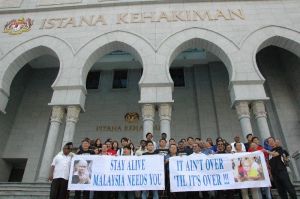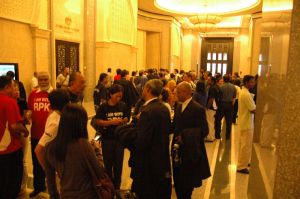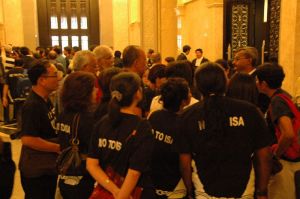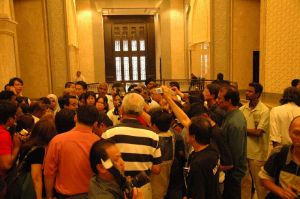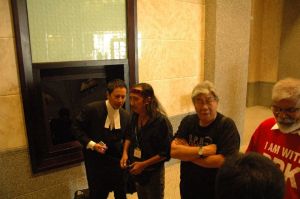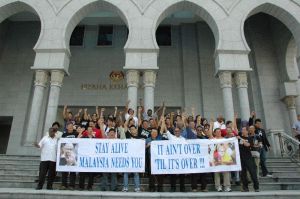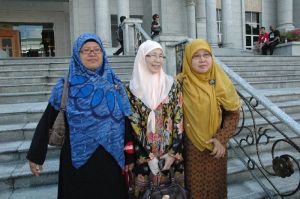
Today I tagged along with our Human Rights Activists who have been fighting Police Abuses for a long time – S. Jayathas, S. Surendran, YB S. Manikavasagam (MP for Kapar) and YB M.Manohar(MP for Teluk Intan). to find out what actually transpired when the 6 were killed by the Police in Kulim.
Ever since their killing the other day I have been very bothered by the event. The media shouted out “criminals” – as if that was the foregone truth. The Police had executed all 6 of them as if they were the Prosecutor, Judge and Executioner all in one and utterly above the law. It was not one, not two, it was six and it seems with impunity. Every one had their own view of the episode. But I needed some answers.
At the outset let me say that I am not condoning crimes or criminals, but there are so many questions that this incident raises that we need some good answers, and fast, as this situation seems to be spinning out of control – before the ink dries on one, another seems to happen. Kugan’s case before Prabakaran’s settled, and now the six before Kugan’s case is settled.
We visited the shootout site, the families of 3 of the deceased and spent some time with the neighbour at the shootout site. The picture that emerges is different than what the mainstream media has been putting out. The MSM paints a picture that the Police only returned fire after being shot at and that this turn of events was totally unavoidable and that they were dealing with a bunch of unscrupulous criminals.
Let me detail some of the facts we gathered before commenting on them. The scene of the shooting was in a small town of Karangan some 15km from Kulim. It was in a small house which was being renovated in one of the backroads of Karangan, a little off the main road of the town. The fence around the house was a tall wall made up of corrugated sheet – something you would do to cut off from view what was going on inside.
A very forthcoming neighbour told us that when he returned home from work that rainy night at around 10 or so he was met with a large group of police men in front of his house, who had already packed his family into the prayer room of his house in the event of stray bullets during the impending ambush. He was asked to get in with them. He only heard the frightening shootout that dreadful night from within his prayer room.
The shootout took place at around 10.30, a very noisy and frightening episode, narrated that neighbour. There did not seem to be any attempt by the Police to try to get the people they were seeking, out from the premises, by summoning them out first using hailers or some such device, before the shoot out. The shooting just happened. The neighbour knew nothing more till the bodies of the killed men were removed at somewhere between 4 and 5 am the next morning.
The first of the killed men, the one that the Police probably had a reason to get, the owner of the house where the shootout happened, was shot in the middle of the top of his head, top down it appeared, though his death certificate indicated he died due to shot wounds in his chest. The family of this victim, mentioned he had several more shots on the front side of his body – as if someone shot at him from the front. This individual, we were told by the family had no prior police record.
l
The second victim that we visited was someone who was actually working in Singapore for a company called SBS (maybe the Singapore Bus Company) who had come back to Kulim for a holiday. He was due to go back shortly and had a return ticket for that. His death certificate also indicated death due to shots in the chest. Apparently he had several shot wounds on the front side of his body also, as if shot from the front. He appeared to be a friend of the first victim. It is not clear from the little information we got that this person was at all a close accomplice or even a participant in any crime that may have been in the works. Of course, I am concluding this with very little information, but these are the facts as we got them from the family. The family was distraught, because this had damaged the standing of the family in the community, having their dead son branded a criminal. This victim also has no past criminal record, we were told by the family.
The third family we visited was that of a young chap of about 20. His family lives in a dilapidated little estate house in Padang Serai. He had seven siblings and it was obvious the family was just existing. This young chap it appears was working for the first victim assisting in the renovation of the house where the shootout happened. The parents did not seem to know much more about what he did. He was obviously not being paid very much, as he had just 2 days before the incident asked one of his family members for 20 ringgits. He had shot wounds on the forehead and it looked like the back of his head was all bloodied as if from an exiting bullet. He was dressed only in a towel at the time of his death. His parents even had difficulty putting together some money to buy him a shirt and a dhoty for his burial. 36 ringgits was all they had. They could not even afford the coffin in which he was ultimately buried. The Police disallowed the victims kin to examine the body when they tried to. The body was all bloodied in the front. This victim also has no past record, we were told.
To say the least, this was a carnage. It appears like we are in Gaza or in Iraq or in Afghanistan or even in SriLanka – the scale and method of killingsuggests nothing short of this. Let me ask, are we in one of these countries or is Malaysia descending there?.
It looks like Indian lives have become very cheap, very cheap in this country – the lives of anjing keeling, yes that’s what it is, the cheap lives of the anjings - that they can be wasted in this manner. Uthaykumar was so right!.
By all of this, I am in no way saying crime is alright. What I am saying is the way the problems of crime are being dealt with. Let me layout some perspectives for you all to consider:
1) What was the need to kill these people? They were not terrorists. They had no previous records. They were not murderers, surely not the mafia. They could have been easily arrested. In fact the first victim regularly stays is just a stone’s throw from the Police Station. Why were they not apprehended? Or why were they not given a chance to come out with their hands up to surrender themselves for arrest – even in war this is done?. Why were they not given this chance?
2) We understand there were a number of sharp shooters from around the country on hand for the job for the Police. This seem to indicate that this was planned kill event.
3) Why was it that the shot wounds were all in the front side of the victims – not any location on the body, but systematically on the front side?
4) One victim was shot on the top of the head, how could that happen in a normal exchange of fire. That seems to suggest some crouching position and a shot into the head, from the top.
5) Why were the victims not shot at on their legs or where they will not be killed but disabled on being shot?
6) Why were the kin of one of the victims denied their right to inspect the body?
7) If it was a shootout between the Police and the victims, only two could have had the guns, as the police produced two guns, why were the shot wounds so systematic in the chest and the heads on all three of the victims? We do not know about the other two victims – but I suspect they will show similarities.
In summary this ugly incident in the series of incidents of police killing and atrocities seem to emphasise the following issues.
a) The Police in Malaysia continue killing Indian crime suspects with impunity – taking upon themselves the role of Prosecutor, Judge and Executioner all in one. I am sure that the powers be know exactly what they are doing. So, we have to take it that they are trying to provoke a response from us so they can slam emergency rule snd set us all back?
b) The Police very urgently need to be Policed . That looks like a very remote possibility, as long as UMNO rules this country of ours. . See what’s happening to the reform driven MACC, it has become just another tool of UMNO. Any IPCMC will probably end up in that same rubbish bin. In any case this UMNO regime seems to be promoting Police brutality as a means of maintaining their hold on the levers of power.
c) So many crime suspects in Malaysia are from among the Indian community.? I think the answer to this has been already abundantly answered by Uthayakumar – this underclass of Indians are a direct result of the UMNO policies over the last 50 years of marginalizing Indians – neglecting the development of the Indian community. There does not yet seem to be any serious effort to get to the bottom of this problem.
d) The way the Police are shooting Indian crime suspects seem to give additional credence to the racist line of UMNO – the anjing keling line.. They seem to be wittingly or unwittingly creating a stereotype of the Indians in the country – despicable, troublecausing and uncouth Indian. What do you think the jibes of children in school reflect – when little Indian children are called “anjing keling” by their Malay classmates.
e) Poverty seems to be intertwined with all of this. Take the case of the third victim that we visited - what kind of money was he making for him to be lumped up and shot. Does this make sense, 20 years old, barely making a living and then shot in the middle. These are the youth of the country who should be nurtured and built up into the the human potential we so much need.
This is all very infuriating.
There comes a time when all of this has to stop. This cannot continue. UMNO , stop playing games and get on with doing something positive about the problem. If you do not know how, then get expert help, I am sure there are agencies around the world that can help. Or are we to take it that you just do not want to , and then the only way we can find some resolution to the problem is by replacing you, UMNO.
UNITED WE MUST STAND
UNITED WE MUST ACT!!!!!
 He added that the inaction undermined the public accountability and transparency of the government in relation to protection of human rights in Malaysia.
He added that the inaction undermined the public accountability and transparency of the government in relation to protection of human rights in Malaysia. A video clip taken at the Serdang Hospital mortuary revealed severe lacerations on the body of deceased, prompting the family to allege foul play.
A video clip taken at the Serdang Hospital mortuary revealed severe lacerations on the body of deceased, prompting the family to allege foul play.

